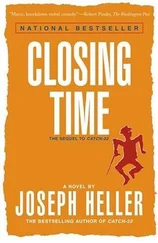“We were speaking about something else,” he reminded the chaplain cuttingly at last. “We were not speaking about the firm, ripe breasts of beautiful young girls but about something else entirely. We were speaking about conducting religious services in the briefing room before each mission. Is there any reason why we can’t?”
“No, sir,” the chaplain mumbled.
“Then we’ll begin with this afternoon’s mission.” The colonel’s hostility softened gradually as he applied himself to details. “Now, I want you to give a lot of thought to the kind of prayers we’re going to say. I don’t want anything heavy or sad. I’d like you to keep it light and snappy, something that will send the boys out feeling pretty good. Do you know what I mean? I don’t want any of this Kingdom of God or Valley of Death stuff. That’s all too negative. What are you making such a sour face for?”
“I’m sorry, sir,” the chaplain stammered. “I happened to be thinking of the Twenty-third Psalm just as you said that.”
“How does that one go?”
“That’s the one you were just referring to, sir. ‘The Lord is my shepherd; I-‘”
“That’s the one I was just referring to. It’s out. What else have you got?”
“’Save me, O God; for the waters are come in unto-‘”
“No waters,” the colonel decided, blowing ruggedly into his cigarette holder after flipping the butt down into his combed-brass ash tray. “Why don’t we try something musical? How about the harps on the willows?”
“That has the rivers of Babylon in it, sir,” the chaplain replied. “’…there we sat down, yea, we wept, when we remembered Zion.’”
“Zion? Let’s forget about that one right now. I’d like to know how that one even got in there. Haven’t you got anything humorous that stays away from waters and valleys and God? I’d like to keep away from the subject of religion altogether if we can.”
The chaplain was apologetic. “I’m sorry, sir, but just about all the prayers I know are rather somber in tone and make at least some passing reference to God.”
“Then let’s get some new ones. The men are already doing enough bitching about the missions I send them on without our rubbing it in with any sermons about God or death or Paradise. Why can’t we take a more positive approach? Why can’t we all pray for something good, like a tighter bomb pattern, for example? Couldn’t we pray for a tighter bomb pattern?”
“Well, yes, sir, I suppose so,” the chaplain answered hesitantly. “You wouldn’t even need me if that’s all you wanted to do. You could do that yourself.”
“I know I could,” the colonel responded tartly. “But what do you think you’re here for? I could shop for my own food, too, but that’s Milo’s job, and that’s why he’s doing it for every group in the area. Your job is to lead us in prayer, and from now on you’re going to lead us in a prayer for a tighter bomb pattern before every mission. Is that clear? I think a tighter bomb pattern is something really worth praying for. It will be a feather in all our caps with General Peckem. General Peckem feels it makes a much nicer aerial photograph when the bombs explode close together.”
“General Peckem, sir?”
“That’s right, Chaplain,” the colonel replied, chuckling paternally at the chaplain’s look of puzzlement. “I wouldn’t want this to get around, but it looks like General Dreedle is finally on the way out and that General Peckem is slated to replace him. Frankly, I’m not going to be sorry to see that happen. General Peckem is a very good man, and I think we’ll all be much better off under him. On the other hand, it might never take place, and we’d still remain under General Dreedle. Frankly, I wouldn’t be sorry to see that happen either, because General Dreedle is another very good man, and I think we’ll all be much better off under him too. I hope you’re going to keep all this under your hat, Chaplain. I wouldn’t want either one to get the idea I was throwing my support on the side of the other.”
“Yes, sir.”
“That’s good,” the colonel exclaimed, and stood up jovially. “But all this gossip isn’t getting us into The Saturday Evening Post , eh, Chaplain? Let’s see what kind of procedure we can evolve. Incidentally, Chaplain, not a word about this beforehand to Colonel Korn. Understand?”
“Yes, sir.”
Colonel Cathcart began tramping back and forth reflectively in the narrow corridors left between his bushels of plum tomatoes and the desk and wooden chairs in the center of the room. “I suppose we’ll have to keep you waiting outside until the briefing is over, because all that information is classified. We can slip you in while Major Danby is synchronizing the watches. I don’t think there’s anything secret about the right time. We’ll allocate about a minute and a half for you in the schedule. Will a minute and a half be enough?”
“Yes, sir. If it doesn’t include the time necessary to excuse the atheists from the room and admit the enlisted men.”
Colonel Cathcart stopped in his tracks. “What atheists?” he bellowed defensively, his whole manner changing in a flash to one of virtuous and belligerent denial. “There are no atheists in my outfit! Atheism is against the law, isn’t it?”
“No, sir.”
“It isn’t?” The colonel was surprised. “Then it’s un-American, isn’t it?”
“I’m not sure, sir,” answered the chaplain.
“Well, I am!” the colonel declared. “I’m not going to disrupt our religious services just to accommodate a bunch of lousy atheists. They’re getting no special privileges from me. They can stay right where they are and pray with the rest of us. And what’s all this about enlisted men? Just how the hell do they get into this act?”
The chaplain felt his face flush. “I’m sorry, sir. I just assumed you would want the enlisted men to be present, since they would be going along on the same mission.”
“Well, I don’t. They’ve got a God and a chaplain of their own, haven’t they?”
“No, sir.”
“What are you talking about? You mean they pray to the same God we do?”
“Yes, sir.”
“And He listens?”
“I think so, sir.”
“Well, I’ll be damned,” remarked the colonel, and he snorted to himself in quizzical amusement. His spirits drooped suddenly a moment later, and he ran his hand nervously over his short, black, graying curls. “Do you really think it’s a good idea to let the enlisted men in?” he asked with concern.
“I should think it only proper, sir.”
“I’d like to keep them out,” confided the colonel, and began cracking his knuckles savagely as he wandered back and forth. “Oh, don’t get me wrong, Chaplain. It isn’t that I think the enlisted men are dirty, common and inferior. It’s that we just don’t have enough room. Frankly, though, I’d just as soon the officers and enlisted men didn’t fraternize in the briefing room. They see enough of each other during the mission, it seems to me. Some of my very best friends are enlisted men, you understand, but that’s about as close as I care to let them come. Honestly now, Chaplain, you wouldn’t want your sister to marry an enlisted man, would you?”
“My sister is an enlisted man, sir,” the chaplain replied.
The colonel stopped in his tracks again and eyed the chaplain sharply to make certain he was not being ridiculed. “Just what do you mean by that remark, Chaplain? Are you trying to be funny?”
“Oh, no, sir,” the chaplain hastened to explain with a look of excruciating discomfort. “She’s a master sergeant in the Marines.”
The colonel had never liked the chaplain and now he loathed and distrusted him. He experienced a keen premonition of danger and wondered if the chaplain too were plotting against him, if the chaplain’s reticent, unimpressive manner were really just a sinister disguise masking a fiery ambition that, way down deep, was crafty and unscrupulous. There was something funny about the chaplain, and the colonel soon detected what it was. The chaplain was standing stiffly at attention, for the colonel had forgotten to put him at ease. Let him stay that way, the colonel decided vindictively, just to show him who was boss and to safeguard himself against any loss of dignity that might devolve from his acknowledging the omission.
Читать дальше












